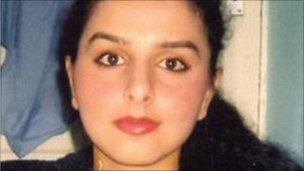'Honour' attack numbers revealed by UK police forces
- Published

UK police recorded at least 2,823 so-called honour attacks last year, figures from 39 out of 52 forces show.
A freedom of information request by the Iranian and Kurdish Women's Rights Organisation (Ikwro) revealed that nearly 500 of these were in London.
Among the 12 forces also able to provide figures from 2009, there was an overall 47% rise in such incidents.
Honour attacks are punishments on people, usually women, for acts deemed to have brought shame on their family.
'Mutilations'
Such attacks can include acid attacks, abduction, mutilations, beatings and in some cases, murder.
Ikwro said its research, carried out between July and November, is the best national estimate so far of the extent of honour violence in Britain, although the charity says the figures do not give the full picture.
They found that eight police forces had recorded more than 100 honour-based attacks each in 2010.
The Metropolitan Police had the most at 495, followed by West Midlands (378), West Yorkshire (350), Lancashire (227), Greater Manchester (189), Cleveland (153), Suffolk (118) and Bedfordshire (117).
Of the 12 police forces able to provide 2009 comparison figures, nine recorded a rise in attacks and three saw totals fall.
The biggest rise was in Northumbria, which saw figures leap by 305% from 17 in 2009 to 69 in 2010, followed by a 154% jump in Cambridgeshire from 11 to 28.
A quarter of police forces in the UK were unable or unwilling to provide data and communities have often been reluctant to talk about the crime, Ikwro said.
Its director Diana Nammi said families often tried to deny the existence of honour attacks and those who carried them out were "very much respected".
She told the BBC: "The perpetrators will be even considered as a hero within the community because he is the one defending the family and community's honour and reputation."
She added that there was not enough support for victims, and many needed continuing help and protection.
"For some cases, police and some organisations just help them up to a length of time, then they will stop," she said.
"With honour-based violence, the threat may be a lifetime threat for them."
'Significant number'
Ikwro's report said: "This is the first time that a national estimate has been provided in relation to reporting of honour-based violence.
"The number of incidents is significant, particularly when we consider the high levels of abuse that victims suffer before they seek help."
Diana Nammi says she suspects the real picture is "far darker" than figures show
The Metropolitan Police said its domestic violence training for officers included the issues of honour-based violence and forced marriage.
The force said that in addition each of the 32 London boroughs had a community safety unit, with a total of more than 560 specially trained officers.
A spokesman said: "The Metropolitan Police Service has been on a significant journey regarding how we police honour-based violence over the past decade, and has played an instrumental part in developing work in this field.
"We have used our organisational learning over the years to inform our current policies, staff training and operating procedures.
"We know that like other hate crimes, honour-based violence is under-reported however, and remain very concerned about this."
The Association of Chief Police Officers (Acpo) published a strategy in 2008 aimed at gauging the scale of the problem and recommending that all English and Welsh forces start recording the number of honour incidents.
Of the UK's 52 forces, 45 have now done that, although there is no national guidance in Scotland.
The 52 comprise 39 in England, four in Wales, eight in Scotland, and the Police Service of Northern Ireland.
Commander Mak Chishty, the Association of Chief Police Officers lead for honour-based violence, said he was satisfied the 2008 strategy was being implemented.
"We're now in consultation on a new strategy. All front-line staff have received awareness training and every force has a champion on honour-based abuse.
"Acpo is confident that any victim who comes to us will receive the help they need."
A Home Office spokesman said: "We are determined to end honour violence and recognise the need for greater consistency on the ground to stop this indefensible practice.
"Our action plan to end violence against women and girls sets out our approach to raise awareness, enhance training for police and prosecutors and better support victims."
- Published10 November 2010